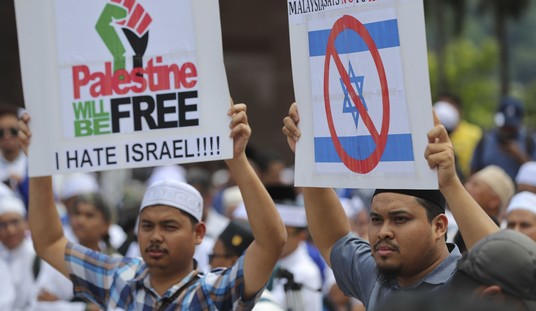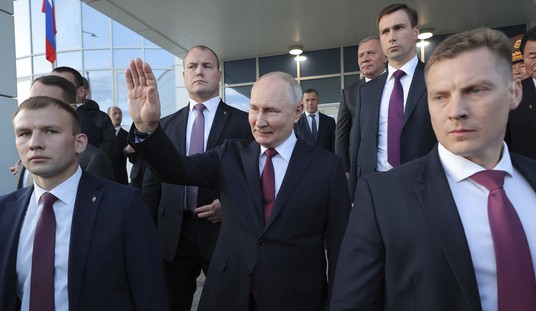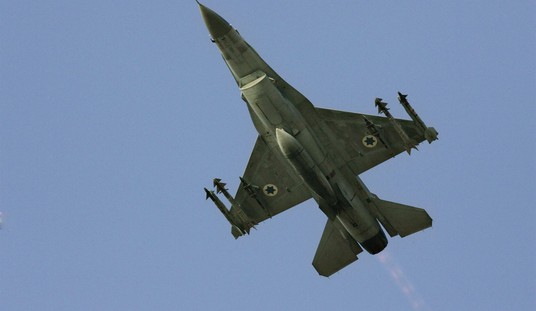The attempt to build a coalition of military allies against ISIS produced conflicting signals in Europe this weekend, but not so much among the Europeans as among the Arab nations invited to Paris to discuss the fight. Secretary of State John Kerry told Face the Nation yesterday that he wasn’t looking for any commitment to ground troops, which is good because so far no offer for that kind of commitment has been publicly forthcoming. There have been offers of air strikes from Sunni nations, though, and perhaps a sense of seriousness about the threat that ISIS represents:
The U.S. says it has found Arab nations willing to commit military assets – some even ground troops – but says it’s too early to name specific countries.
Kerry says he expects regional allies to help on a number of fronts. They range from humanitarian aid to going after ISIS finances and it’s sophisticated propaganda machine. .
“Well we’re not looking to put troops on the ground,” he said. “There are some who have offered to do so, but we are not looking for that at this moment anyway.”
But it’s securing military commitments that will be most critical as administration officials continue to promise there will be no U.S. combat troops in Iraq or Syria.
It’s not that there haven’t been any offers of boots on the ground, but just none that the US can accept:
The reluctance of the U.S. and its major Sunni allies in the region to engage the two nations most eager to combat ISIS is one of the bigger underlying problems, explains CBS News foreign affairs analyst Pamela Falk.
“The only nations which have been out front to offer boots on the ground are Iran and Syria,” said Falk, “and the U.S. doesn’t want it.”
Speaking Sunday on “Face the Nation,” Kerry insisted the objective was not to secure guarantees of boots on the ground — from any nation.
We will need to have boots on the ground in some fashion to roll back ISIS from the significant territory that they now control. Dropping bombs and missiles might make for a good assassination strategy, but it won’t dislodge an army in place for any length of time unless another army seizes the ground from which ISIS makes tactical retreats. The US would prefer that the Iraqi army and Kurdish peshmerga take that role, but the peshmerga are underarmed and the Iraqi army in disarray.
Still, that’s all the White House has at the moment:
On NBC’s “Meet the Press.” McDonough said the president “was preparing the country” for the effort against the Islamic State and that the administration has underscored that “in as much as we’ve been at war with al-Qaeda since we got here, we’re at war with ISIL.”
McDonough repeated the strategy Obama unveiled last week on winning that war: a coalition that continues airstrikes against the forces of the Islamic State, using the “unique capabilities” of the United States: “air power, intelligence surveillance, reconnaissance and our training ability” to strengthen the opposition to the organization.
Asked by moderator Candy Crowley on CNN’s “State of the Union” whether any of those coalition partners would add ground forces to the conflict, McDonough refused to “front-run” any announcements. But he made clear that the short-term strategy is to fund the Iraqi army to fight the Islamic State in Iraq and the Syrian opposition to fight in Syria — hopefully with congressional approval.
Well, about that Syrian opposition …
As the United States begins to deepen ties with moderate Syrian rebels to combat the extremist group ISIS, also known as the Islamic State, a key component of its coalition appears to have struck a non-aggression pact with the group.
According to Agence France-Presse, ISIS and a number of moderate and hard-line rebel groups have agreed not to fight each other so that they can focus on taking down the regime of Syrian President Bashar Assad. Other sources say the signatories include a major U.S. ally linked to the Free Syrian Army. Moreover, the leader of the Free Syrian Army said Saturday that the group would not take part in U.S. plans for destroying the Islamic State until it got assurances on toppling Assad.
The deal between ISIS and the moderate Syrian groups casts doubt over President Barack Obama’s freshly announced strategy to arm and train the groups against ISIS.
No kidding. This demonstrates the feckless, tactical-only approach to the conflict that this White House has used all along. The decision was made not to use US ground troops, but ground troops are absolutely necessary, which meant that Obama and his team had to look around for some other fighting force to provide them. That’s what produced the idea of having the Saudis train the so-called moderates in Syria. But the “moderates” in Syria include a lot of Islamist fighters, and all of them are fighting to defeat Assad, not other Islamists. They aren’t interested in being a proxy army for the US, or for the Saudis either. It makes sense for them to cut a deal with ISIS that allows them to focus on Assad, not the other way around.
Perhaps our new allies in the Arab League can explain this to Kerry and Obama this week. In the meantime, don’t expect to see anything except tactical air strikes for the foreseeable future.








Join the conversation as a VIP Member